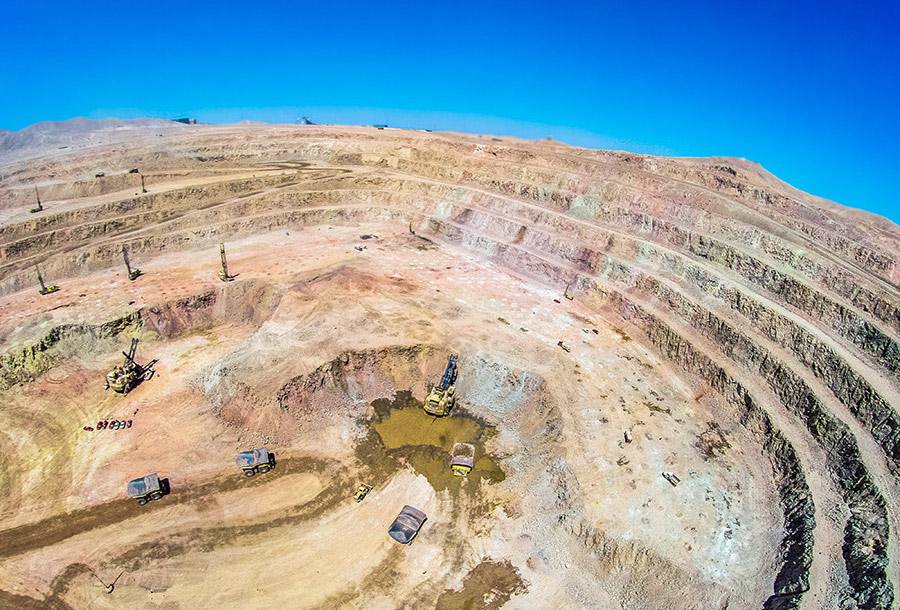Chile copper production at risk as coronavirus bites

Chile’s vaunted copper industry is nearing a tipping point as coronavirus explodes across the South American nation, mine workers and analysts say, laying bare the hidden costs of policies that have until now salvaged its output of the red metal.
Since early April leading miners, including state-owned Codelco, BHP, Anglo American, Glencore and Antofagasta have doubled down with skeleton crews in the world’s largest copper producer, churning out more amid the pandemic than the year before.
But cracks are beginning to show, union leaders told Reuters. Patricio Elgueta, president of Chile’s Federation of Copper Workers (FTC), an umbrella group for Codelco’s unions, said miners are exhausted and scared of falling ill but keep working to make ends meet.
Elgueta said unions were weighing a proposal from a regional roundtable of healthworkers, politicians and social groups to draw down production to a “minimum” at all of the mines around the hard-hit city of Calama in order to sanitize them.
Emphasis at the major mines had necessarily shifted to processing ore as companies have scaled back staffing by around 40%
The Antofagasta region, where Calama is located, accounts for more than half of Chile’s mine production, according to state copper agency statistics.
Meanwhile, Elgueta said emphasis at the major mines had necessarily shifted to processing ore as companies have scaled back staffing by around 40%. Contract work has already largely been slashed.
“You focus on production and neglect maintenance… it’s not sustainable,” Elgueta said in a phone interview. “First you exhaust the workers, then you cause damage to the equipment, then come delays.”
Juan Carlos Guajardo, head of Santiago-based consultancy Plusmining, told Reuters the industry was coming “dangerously close to the edge.”
He said an industry-wide policy of “buying time” by trimming staff and tightening safety measures had been successful, wowing the market even as Peru’s mines were hit by weeks of inactivity. These measures were now catching up with Chile’s miners, he added.
“We’re in the worst moment of the health crisis with respect to the mining industry,” he said. “(Chile) bet that the sanitary crisis would be manageable, but that’s not what’s happened.”
The outbreak has exploded in Chile, with cases surpassing those in Italy and cresting 275,000 this week. The pandemic has spread northward to cities like Antofagasta and Calama dedicated to servicing the northern desert region’s sprawling mines.
CTMIN, an umbrella group that represents 80% of Chile’s mine workers, said on Wednesday it had confirmed nine deaths from covid-19 industry-wide.
Liliana Ugarte, president of union No. 2 at Codelco’s Chuquicamata mine, outside Calama, told Reuters it was time for the industry to reassess. She said the state miner should “adjust its production plans according to the current circumstances.”
Codelco CEO Octavio Araneda said in an interview with local daily El Mercurio on Thursday that any further restrictions on mining would be “catastrophic” for Chile. He rejected allegations the company had fumbled the virus response.
Guajardo, the consultant, said the worsening situation meant Chile’s official estimate, issued just last week, of a dent in production of 200,000 tonnes now looked conservative. He said his group estimated in April a reduction of 5.5% versus 2020 production forecasts, or 320,000 tonnes, but would revise it again shortly.
“We think that (number) should rise alongside increasing restrictions,” Guajardo said.
Avalanche of cases
What began as a skirmish between workers and management at mines has increasingly spanned into politics as the epidemic has worsened, analysts and miners say.
The center-right government of President Sebastian Pinera, which has promoted a balance between safety and mining output, is beefing up inspections and tightening restrictions on movement throughout the region.
In a letter to Health Minister Enrique Paris late on Tuesday obtained by Reuters, community and social groups in mining hub Calama warned of an “avalanche” of cases and demanded miners undergo a “quarantine of 14 days, halting programs, operations and production.”
Mining accounts for as much as 15% of Chile’s gross domestic product, and half of the country’s exports.
Chile’s Mining Minister Baldo Prokurica said last week the industry needed to continue to operate to float a massive stimulus package.
Jaime Sepulveda, an analyst with industry consultancy CRU, said the Chilean government could not afford for the copper industry to shudder to a halt.
“The Peruvian government didn’t consider mining to be critical, but Chile did. This government firmly believes that mining companies in Chile cannot stop.”
(By Dave Sherwood, Natalia Ramos and Aislinn Laing; Editing by Christian Plumb and Daniel Wallis)
{{ commodity.name }}
{{ post.title }}
{{ post.date }}




Comments